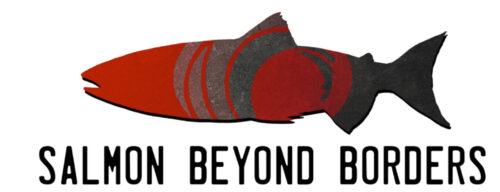
Rep. Peltola Calls For International Watershed Board To Help Protect B.C.-Alaska Salmon On Transboundary Rivers
The following press release is courtesy of Salmon Beyond Borders:

Salmon Beyond Borders applauds Rep. Mary Peltola’s call today for the creation of an international watershed board on AK-BC wild salmon rivers
JUNEAU, AK—Representative Mary Peltola, D-AK, today made a statement and issued a press release asserting her “support for an International Watershed Board to address mining impacts on British Columbia and Southeast Alaska rivers.” The statement comes as the International Joint Commission, a U.S. and Canadian commission that prevents and resolves disputes under the U.S.-Canada Boundary Waters Treaty of 1909, meets this week in Washington, D.C. to discuss, among other topics, British Columbia’s ongoing and threatened contamination of international rivers flowing from the Canadian province of British Columbia (B.C.) into Alaska, Montana, Idaho and Washington states.
“With this statement, Representative Peltola makes clear that she stands with Tribes and Southeast Alaska communities to defend our clean water, wild salmon rivers, and wild salmon ways of life from Canada’s risky, acidic, large-scale mining upriver,” said Salmon Beyond Borders director Breanna Walker. “We thank Representative Peltola for her leadership and we call on the Biden Administration to act quickly and decisively to implement international watershed boards through the International Joint Commission, and to ensure Americans downstream are able to meet Canadians at the table — so that we don’t have to meet them at the disaster cleanup site.”
A watershed board is an international process established through the International Watersheds Initiative of the International Joint Commission and Boundary Waters Treaty that brings together people from all impacted jurisdictions. Leaders throughout Southeast Alaska are calling for the establishment of those protections, and for the Biden Administration to ensure a watershed board is in place, before B.C. expands existing mines or develops new ones in the Taku, Stikine-Iskut, and Unuk-Nass watersheds, which flow from B.C. into Southeast Alaska.
Read Representative Mary Peltola’s statement and see contact information for her office.
Background:
The T’aak? (Taku), Shtax’héen (Stikine) and Jóonax (Unuk) watersheds, which flow from the glaciated boreal forests of northern British Columbia into the temperate rainforest of Southeast Alaska, total about 35,000 square miles of some of the last remaining wild salmon habitat left on Earth. Together, these iconic rivers and their watersheds are about the size of Portugal, and have been centers of culture, commerce, and biodiversity for tens of thousands of years. The Taku is the largest roadless watershed on the West Coast of North America; the Stikine is the fastest free-flowing river in North America. These rivers are home to all five species of wild Alaska salmon, brown bears, moose, Dolly Varden, hooligan, steelhead, and many other species significant for cultural and economic well-being. These rivers have nourished Indigenous peoples since time immemorial and are centers of culture and commerce. Now, the Taku, Stikine, and Unuk rivers account for nearly $50 million in economic activity annually in Alaska and are integral to the overall $1 billion annual salmon fishing industry and $1 billion annual visitor industry in the region.
Just over the political border, British Columbia, Canada (B.C.) has more than two dozen large-scale mines – ranging from abandonment to advanced exploration, development or operation – in the spawning and rearing headwaters of these shared salmon watersheds.
B.C.’s track record is exemplified by:
- The 2014 mine waste dam failure at Mount Polley in the Fraser River watershed;
- The decades-long contamination from the abandoned Tulsequah Chief mine in the transboundary Taku watershed;
- The lack of required consent for mining in traditional territories, and B.C.’s lack of meaningful engagement with sovereign Tribal nations in Alaska;
- B.C.’s more than $1 billion Canadian shortfall for cleanup of mines post-closure;
- B.C.’s lack of analysis of cumulative effects from multiple mines; and more.
Almost 20% of these watersheds overall are staked with B.C. mineral claims and tenures.
Almost 90% of the B.C. side of the Unuk River is staked with B.C. mineral claims and tenures. And yet, Tribes, fishermen and Alaskans downstream have no meaningful voice in the future of rivers that are key to jobs, food security and way of life.
A pathway towards a solution that has been requested by thousands of Southeast Alaskans involves a reference to the International Joint Commission, or IJC. This Commission was established under the U.S.-Canada Boundary Waters Treaty of 1909. This international process can bring together federal and sovereign governments and communities on both sides of the political border to prevent and resolve concerns related to shared waterways.
All four U.S. states downstream of B.C. — Alaska, Washington, Montana and Idaho — are experiencing contamination from abandoned and/or operating B.C. mines. Meanwhile, B.C. plans to double the number of mines in the province along waters that flow into U.S. communities. Many of those mines have massive mine waste dams that will have to hold back lakes of toxic mining waste forever. A study showed that two B.C. mine waste dams will fail every ten years, on average.
Salmon Beyond Borders is an Alaska-based campaign working with fishermen, business owners, community leaders and concerned citizens, alongside Tribes and First Nations on both sides of the Alaska-B.C. border, to defend and sustain our transboundary wild salmon rivers, jobs, and way of life.



